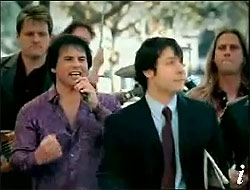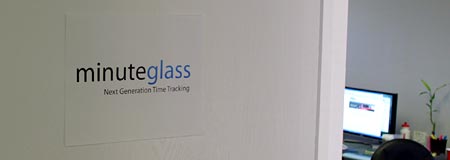Here is a really clever clock which has more than 150 analog hands. Each hand rotates and spells out the hour of the day. In the example photo below, the four is visible. Click here to watch an animation of how it works.
Month: April 2008
Measure everything important and track everything worth tracking
I’ve been thinking about the next generation web design studio quite a bit lately. What makes a team efficient? How can small teams maximize efficiency?
Bob Parsons who runs Go Daddy has written about tracking and measuring important business numbers. I read this and said “yeah, I need to do that.”
One thing I learned early in my business career is that anything of significance that is measured and watched, improves.
Back before I started Parsons Technology I became impressed with something I read about John D. Rockefeller. In fact, I still think about it and use it to this very day. I learned that Mr. Rockefeller was one of the few people in his industry (perhaps the only one) who knew exactly how much it cost to extract, refine and deliver a barrel of oil. In fact, he was entirely aware of all his costs. Knowing this information (and acting on it) gave him a huge competitive advantage. He knew how much he could price a barrel of oil for and still turn a profit. He was always keenly aware of each area of revenue, cost and market share, and he worked on improving in every area. As a result, he did cost saving things like manufacture his own oil barrels, have his own cartage company, and on and on.
The first sentence is the most important. Read it if you skipped over it.
This all brings me to my point. I think it’s very important to track the numbers that make your business a success. I’ve tried to do this over the years and have tracked a large number but never to the extent I want (for numerous reasons, not that I didn’t try).
As I said, I’ve been thinking about the next generation web firm and wondered what numbers you track in your business or where you work? The obvious things like revenue and billable hours are obvious, the less obvious are things like average employee utilization across a period of time, or average timespan to develop a site… How does this affect the bottom line? Does it give you a competitive advantage? I’ve got loads of ideas about things that can be tracked. Putting systems in place to actually track them (consistently) is the next step.
Safe Jobs
 On Saturday morning I packed up my camera and went to a little open house a friend of mine was throwing. It was a great time and of course I got to take pictures with my flash. There were a bunch of new people there that I had never met, and one guy in particular caught my attention.
On Saturday morning I packed up my camera and went to a little open house a friend of mine was throwing. It was a great time and of course I got to take pictures with my flash. There were a bunch of new people there that I had never met, and one guy in particular caught my attention.
After asking the two key questions people ask (where do you live and how do you know so and so) someone asked what he did for a living. He said he worked for the city. Then he commented that it was the safest job in the world and said that he would probably have to murder someone in order to get fired.
Maybe it’s time that our cities adopt the GE management idea and regularily trim the bottom 10% from their workforce.
One of the first things I thought about was the idea that “safe” means different things to different people. To this guy, safe means a steady paycheck and benefits. And I suppose he won’t have to dust off his resume too often.
To me, a safe job means that I’m in control of how much money I can make. That doesn’t always mean I get to pick when I work, but ultimately I am in charge.
So this got me thinking. Is there a way to combine both of these worlds. I think that profit sharing plans are a start, however I like some of the things that Semco does in Brasil. They basically put people in charge of their salary along with the ability to hire and fire their managers. Since their co workers can also vote to remove someone, there’s a lot of incentive to be fair.
I know that not everybody is in a position to introduce plans and systems like this, but I think it’s wise to consider and aim towards that goal. The trick always comes down to whether the people on your team have an owners mentality.
What’s the point of this post? Well, I just read a fun article called 10 Reasons You Should Never Get a Job. I have been approaching my business with this model recently. Building up an all-service business is hard because you have to spend time in order to earn money. That’s why I’m slowly moving into ideas that earn residual income. It’s not easy but everything has much greater potential.
And that’s really what it’s all about.
Minuteglass
Our product has had a few names during our development process. Picking a name for a product is incredibly tricky. Not only do you need to come up with a good name that everyone likes, but you have to find the domain name.

Previously, the product was called Roundup, and before that Windstorm.
Now, we’ve come up with a name we’re happy with. It’s Minuteglass. It’s like “hourglass” but for minutes. Get it? We like it and we’re working on logos and also working on the product. We’ve got more people on the team, so the product is coming together faster.
